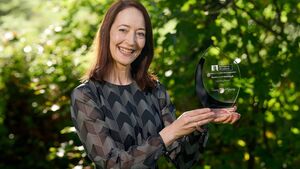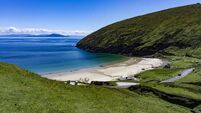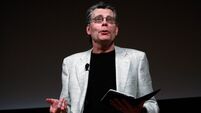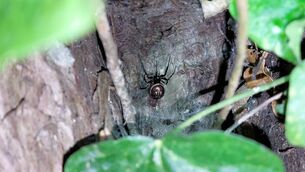Fiona adapts to an ever-changing media landscape

Mayo native Fiona McGarry was awarded the Excellence In Teaching and Learning Award by the Discipline of Journalism and Communication at NUI Galway. Picture: John Kelly
The world of media is a fascinating one – and it’s constantly evolving. Fiona McGarry is someone who has experienced that change first hand while working in print, radio and TV journalism, but also while teaching it to students who want to experience it for themselves.
The Castlebar native has worked at both local and national level in media during her extensive, award-winning career and now lectures in Journalism in University of Galway. She has had a really interesting career path, which constantly weaves between working in the sector herself and teaching it to others.
One thing is for sure, Fiona isn’t afraid to follow her heart and gut when it comes to work, which was very apparent in our chat.
Fiona, thanks for talking to me. Tell me a little bit about background.
I'm from Castlebar. I'm a child of the '70s. I went to St Angela's National School, which I loved and then to St Joseph's Secondary School and did the Leaving Cert there. I went to what back in the day was University College Galway, and is University of Galway today. I did English and French for the BA, absolutely loved it. I stayed there for a couple of years to do a Masters, so I was really lucky that I got funding to do that.
I'm a sucker for education, so then I went to DIT in Dublin after that for a year, which was very, very different to Galway, but I absolutely loved Dublin. It was just such a progressive attitude, people willing to do projects, full of get up and go. I did media production, a very general media production course with film, TV, radio.
I'm very grateful to my family and my parents for being willing to support my journey in education. Even though I had funding it was tough and you're trying to work and study. So I'm very grateful for the opportunities I got in education.
Was there any particular reason you decided to go down the media route, Fiona?
Now that you asked me the question, I remember there was. We had a fantastic lecturer in French. She taught us it was all about media - mainly about the media in France. And she was such a brilliant lecturer. She made it so interesting. She was so dynamic. It made such a strong impression on me. So she was just wonderful.
She explained how media worked. Her energy and her enthusiasm and her understanding of how media works was fascinating.
When I did my Masters, it had a media focus, but it was still quite academic and it was through research. I had enough of it, really, the theory side. When I went to Dublin, it was everything that I thought because it was all about the practice. It was understanding how you tell the stories that get into the media, then how the media select stories, stories that don't make the cut, the stories that pick up and take off. I absolutely loved it.
So where did you go after you finished in DIT?
It was the late '90s - I went initially to a multimedia company in Limerick. Everybody in Limerick was in the tech sector and media production. Then a job came up in the Institute of Technology in Galway in GMIT. I was very lucky to get the job at the time. I was teaching literature within heritage studies. And I was teaching media production in the Cluain Mhuire campus where they have the film studies. So I was between the Cluain Mhuire campus and the campus on the Dublin Road. It was very busy.
I suppose for me, I was working on a lot of theoretical media subjects, and I still had that little bit of a drive to be more practice-based. Even though I absolutely loved it and loved the team, I knew at that stage, starting out, my heart was more in the practical stuff.
So what was the next leap for you Fiona?
It was a huge leap. I decided to go back in and try and get some work in journalism and media production. It was really radio - I was involved with Community Radio in Castlebar, where you just had complete and utter freedom. It was amazing. Peter Killeen was the manager there, and he was superb. He just let me make the programmes I wanted to make. So I was able to use that as a calling card.
So then I knocked on the door of Midwest Radio and eventually they let me in. People perceive the media as being glamorous, and I was lucky in that I knew it wasn't. So I knew the hard work that was involved. And I suppose that was the door opener for me into media, and that led to other doors.
So that did open doors for you Fiona - tell us more about that?
That's the reality and that's the beauty of radio in Ireland is that, certainly in the 2000s, once you had that bit of experience, you could literally go anywhere because people in TV were so impressed with how hard people in radio work. That's what I found. Straight away, people in TV were going, 'oh, wow, if you can do this, you can do that'.
I spent a while in a couple of local radio stations, Radio Kerry, Galway Bay FM. I went to Newstalk in Dublin. I did some time then in print media, which I loved. It was great to be able to get into stories in-depth. With broadcasting, you're skimming the surface of an awful lot of material. But when you're in print, you can really get into the depth.
I then fell back into academia. I was freelancing for a while around 2009, 2010. Then a job came up at the University of Limerick in the journalism section. And again, this was another very lucky break. I was on a panel at first. I didn't get the initial job. And then, as luck would have it, another position came up within the year after the interview. I was in journalism section there.
I got to do a bit of study there. They have a fantastic Department of Teaching and Learning. They were running a diploma course for people teaching in higher education. So I spent a while doing that while I was teaching and absolutely loved it and learning how to teach properly. This was 2014 so it was during the recession. Even though I was very lucky to get the job, getting permanency was very difficult. I would have had to embark on a PhD at that point without the guarantee of any permanent job.
It was, again, another tough decision career-wise. I was offered a job in DIT coincidentally, in academia. But again, there was so much red tape with contracts and starting dates. And the Department of Finance was cutting down on the public sector, so I couldn't get any clarity on my start date. So I was in limbo and I was freelancing, and I had to bite the bullet. And then a job came up in Clare FM. I decided to take that.
You had been doing some media work in the interim as well?
I had been freelancing with BBC in Northern Ireland, in their television researcher section. I would always say to people, don't hesitate to apply for those jobs because I just applied on spec.
While I was in Clare FM, I had done an interview for a job at the University of Galway. The job came up in January 2019, and Clare FM were fantastic because they allowed me to change my hours around to balance the two. So it was working part-time in each place for a number of years. And then I got more and more hours at the university. And it was harder and harder because with radio, you need to give it as much as you possibly can.
So I was very lucky. I flipped over to the . With print, there's a little bit more freedom. If you want to stay up all night writing an article, nobody's going to say a word as long as you meet the deadline. So that slotted in an awful lot more seamlessly with the work at the university. So I continued until 2023, and then my role became permanent in the university.
What's the thing that drives you in your current role Fiona?
It is that energy you get from the students. But it's also the fact that journalism is changing all the time, as we are all too well aware. So you're never teaching the same content from one semester to another. You are keeping up with a field that is very vibrant, very dynamic, and you're always upskilling. We might get a bit of time in the summer to do some extra training. The university is very good for supporting that training.
So you're always driving your own skillset to keep it up to date so you can bring that into the classroom as well. It's keeping up to date with that is part of the motivator as well. It keeps you getting out of bed in the morning and looking forward to it.
And it's the different personalities of your students - it's great to get to know them and get to know a bit about them and their interests. When you're marking, sometimes you're learning an awful lot from what they've gone out and researched and the people they've spoken to. I know it's a cliché, but it's like media, no two days are going to be the same really.
You've always followed your gut with work Fiona - you'd advise people to do that too?
If you're making that big jump, do your research, do the homework, get a bit of practical experience in your spare time. If you want to change careers, just build up your skills, prepare yourself, do the research. But ultimately, it is a leap of faith. There are no real shortcuts. In any of these fields, you will have to put in the time and the effort. But definitely, I think if you have that will, that desire to do it, the curiosity to do it, you prepare yourself, you do the research, and you keep plugging. It's not always going to be easy, but it certainly will be possible.





